Dr. Katheleen Wilkes, distinguished British humanist
Darko Žubrinić, 2011
Glas iz Dubrovnika / The Voice from Dubrovnik was a daily leaflet printed just on one A4 leaf (ie. two pages) that tried to follow the daily life and encourage the citizens of Dubrovnik to endure the dramatic events during the Serbian - Montenegrin siege of the City of Dubrovnik. Short articles published in the Voice from Dubrovnik are important testimonies, and among them especially interesting are those writen by dr. Kathy (Kathleen) Vaughan Wilkes from Great Britain. She lectured philosophy at the Inter-University Centre in Dubrovnik (IUC, since 1980), and at that time she was also the president of the IUC. The centre has been completely destroyed in 6 December 1991 during the Serbian bombing and shelling of the city, and its valuable library burned down to ashes. Subsequently Kathy Wilkes donated several thousand of her books in order to start restoring the libray of the IUC.
Each her article paublished in The Voice of Dubrovnik appears in two columns, in English and Croatian, on the first page of the leaflet. The dates above the articles refer to the dates of their publication. She spent four months in Dubrovnik during the most critical period of its destruction by the JNA ("Yugoslav People's Army", in fact Serbian army) forces. The Voice of Dubrovnik was distributed free of charge, and it existed from 8 November 1991 till 5 March 1992.
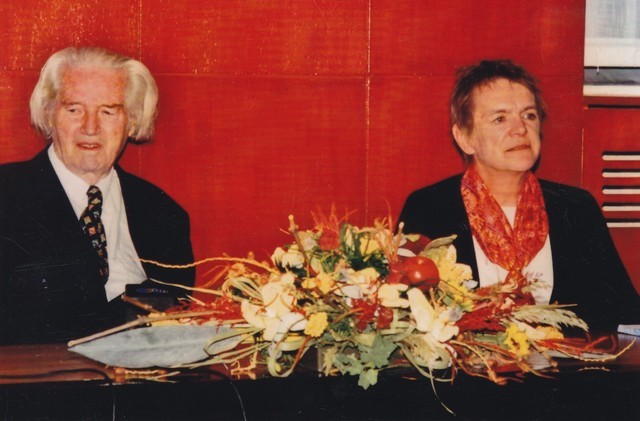 Ivan Supek, a founder of the Inter-University Centre (IUC), with dr. Kathy Wilkes in Dubrovnik. Photo from the hall of the IUC, 1999, by the courtesy of Nada Bruer Ljubišić of the IUC, Dubrovnik.
Kathy Wilkes (1946-2003) has been affectionately nicknamed Kate (ka:te) by her friends in Croatia. She was proclaimed a honorable citzen of the City of Dubrovnik in 1993, awarded with the Hrvatska Danica (Croatian Morning Star) order from the Croatian Government in 1997, and with the honorary doctorate from the University of Zagreb in 2001. Dr. Wilkes died prematurely at the age of 57. According to her last wish, her ashes have been strewn over sea in the City of Dubrovnik.
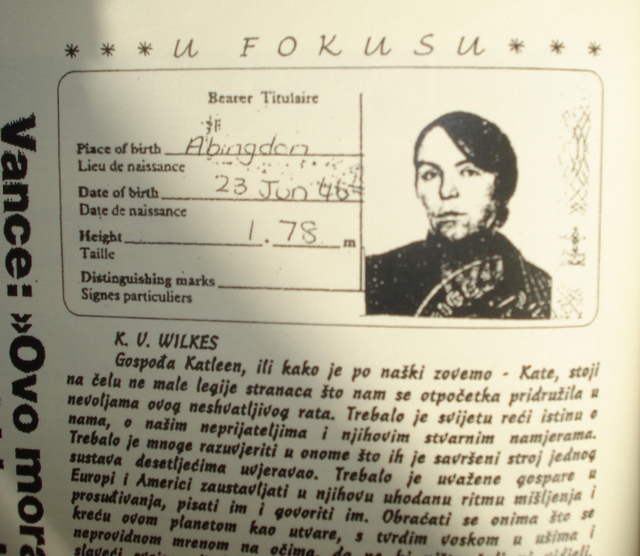 As described below the identity card of dr. Cathy Wilkes, she has been affectionally named Kate (ka:te).
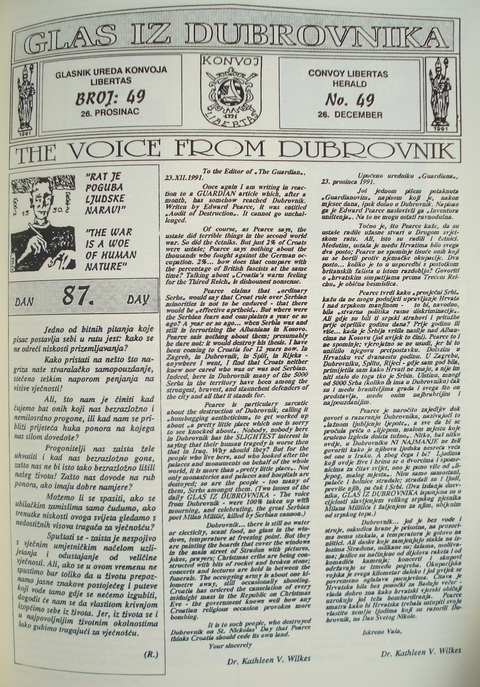 A front page The Voice From Dubrovnik leaflet, 26. prosinac [December] 1991., with English and Croatian columns of the text written by dr. Katheleen V. Wilkes.
A few explanations appearing in angular brackets - [ ] - within the texts written by dr. Kathy Wilkes have been added by Darko Žubrinić.
Shortenings:
JNA - Yugoslav People's Army, at the time of destruction of Dubrovnik and Vukovar without any control of the "Yugoslav government" in Belgrade, in fact Serbian army. By its military potential it was the third or fourth in Europe at that time.
IUC - Inter-University Centre in Dubrovnik
GLAS IZ DUBROVNIKA / THE VOICE OF DUBROVNIK
9. studeni [November] 1991.
The editors of "Glas iz Dubrovnika" [Voice from Dubrovnik] have invited me to contribute regularly - daily, or perhaps every other day. I am honoured to be part of this publication, and will offer you comments from a "British friend of Dubrovnik".
Over the last few months I have grown to hate this word "velika" [great] when applied to countries. Besides, the British Government has been anything but "great" in EC [European Community] discussions about Croatia; I am deeply ashamed for my governemnt. (However, I hope that citizens of Dubrovnik will recognise that the attitude of the British government runs directly contrary to the desire of the vast majority of the British population, who cannot understand why Croatia is not recognised as a sovereign state [Croatia has already been politically recognised in 7th September 1991, by the Badinter Committee]. It is, obviously, bound to happen sooner or later... so why not sooner? Everyone is aghast at the way that the destruction of Croatia meanwhile continues, unchecked by the outside world).
Another comment suitable for an introductor contribution arises from talking to, and seing in action, the EC Monitors; both just recently, and in September/October. Their original brief was to mediate between two sides, between two arguments. There can no longer be any question of "two arguments". Indeed, the arrogance of the aggressor / the arrogance of brute force - is such that what we used to call the JNA [Yugoslav People's Army, in fact Serbian army] makes no attempt to explain, let alone to justify, this attack on a city of joy, of light, of culture. So the EC monitors, if they are to stay (and in some capacity they are needed) must change their terms of reference. Right now there is no point in them begin here unless it is to observe, and protest, the relentless bombing of civilian targets, and the cynical neglect of ceasefire agreements... which the army exploits simply to advance a few kilometers further into the city. And then complain when the Croatian forces try to halt them. The monitors could, for example, oversee the restoration of water and electricity to the city - possibly the aggressors might hesitate before bombing EC monitors directly. They should also register and report the attacks on churches, hospitals, cemeteries, civilian settlements; and, alomost the most tragic of all, the bombing of the refugees in the exposed tourist hotels.
On Wednesday, at an Inter-University Centre conference on the plight of refugees in Croatia, some participants were dissatisfied with the extent of the preparation for the defence and sustenance of the city. But what I have just said goes far to explain this: who could possibly expect or aniticpate such an all-out attack upon civilian targets?
This the centre of Europe; this is 1991.
The world has, rightly, not yet forgotten nor forgiven the allied bombing of Dresden in the Second World War - even though in that war the Germans were the aggressors. Those of us who used to be optimists had thought that such atrocities could not happen again, at lest not in Europe. But now we see a reverse to primitive barbarism.
More comments and impressions soon.
IUC: K.V. Wilkes
GLAS IZ DUBROVNIKA / THE VOICE OF DUBROVNIK
11. studeni [November] 1991.
I write this on Friday afternoon. Like you all, I hear the bombs falling shaking even the Mayor's office, from where I write.
Not surprisingly, my thoughts this afternoon turn towards what we used to call the JNA [Yugoslav People's Army, in fact Serbain army]. Three comments that provoke bitter smiles.
First: did you know that on 31th July [1991] there was a complaint made against Federal Army planes for flying low over the city; it was thought vibrations from the flight might damage the fabric of the city. Vibrations from the flight!
Second: only a very few months ago, when listening to lectures in the Inter-University Centre, I used to curse the siren-salutes with which the navy as it passed greeted the great maritime city of Dubrovnik. Those salutes seriously disrupted the lectures... but now the "salutes" are of a wholly different order, a gunboat has been bombing Srđ [imposing hill above the city] today.
Third: I remember how when I left Dubrovnik in mid-October [1991] on "Slavija" [ferry], a gunboat stopped us just after we had left Split. It went round and around the ferry, but always with the cannon pointing at it. Then, presumably to impress us thoroughly, it went right around the Slavija backwards (incidently soaking all the sailors on board). This struck me as a symbol of contemporary Serbia: going backwards while the rest of Europe goes forwards. And, to judge from the bombing of churches, hospitals, synagogues, cemeteries, housing settlements, ambulances... going backwards not just to unreformed communism, but to something less than human.
As I write, the bombs continue to fall: every Croatian port is blockaded; the sirens have gone again in Zagreb, as here. But Serbia is going backwards while Croatia is struggling forwards; even, today in Dubrovnik - planning concerts, dances, plays, recitals... keeping the spirit of the city alive.
That is whay in the long run you (can I say "we?") will win; but in how long a run, and at what further cost?
I shall content myself with these brief comments today, because I expect that the editors will need space for basic information and advice.
IUC: K.V. Wilkes
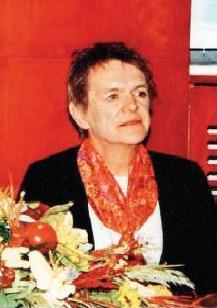
Dr. Kathy Wilkes (1946-1956) in Dubrovnik, honorary citzien of the city since 1993.
She died in Oxford, and according to her last wish, her ashes have been strewn over see in the City of Dubrovnik. Photo from 1999.
GLAS IZ DUBROVNIKA / THE VOICE OF DUBROVNIK
12. studeni [November] 1991.
Today I shall remeber that I am by profession a philosopher, and will brood over this word "negotiate".
I have much sympathy for the Dubrovnik who - when they can - travel, at considerable personal risk, to negotiate with the local [Yugoslav, in fact Serbian] army commanders. Now "negotiate" is a word that implies that there are two tenable positions, two arguments, two sides each or which deserves to be heard. So just what can be the army "case", the army "argument? How do the army negotiators explain the reason for depriving the city of food and many of the tourist hotels - refugees in so many of the tourist hotels - refugees whom they have already bombed out of their villages? What case an army negotiator have for bombing the gynaecological ward of the Medical Centre; the Bishop's Palace; for fire-bombing Lokrum [islet in front Dubrovnik covered with old pine trees] and the few remaining trees on Srđ [hill above Dubrovnik] ... and you can all continue the list?
I thus find my imagination failing me when I try to envisage the course of these "negotiations"; whether it is the Dubrovnik negotiators attempting to talk to the army, or the EC monitors. I am baffled by a very simple question: just what do the army negotiators say? Yesterday there should have been another meeting of the negotiators. But the army made it impossible - far too dangerous - to travel, and so the meeting was cancelled. And yet it was yesterday - Sunday - that, according to the latest Carrington plan (signed by Government and army) the army must start pull out of Croatia. Instead, we received 3.000 granades.
This point can be generalized. We have all grown used the cynical flouting, by the army, of each and every agreement and cease-fire. Now, apparently, the local commanders are even disregarding an agreement signed by Kadijević, their commander-in-chief. But I fear that Kadijević and Milošević will not complain about this breach of military regulations, this insubordination. Kadijević and Milošević, after all, have set the example of ignoring and mocking agreements brokered in the Hague. So what do, what can, they say, when challenged by Carrington or other foreign leaders? Again, my imagination boggles. Talking, even with people as difficult as these two, is of course better than being forced to fight them; but Dubrovnik - and the whole of Croatia - is being Hague let Kadijević and Milošević get away with this. "Negotiate"; a good word, now being cruelly and cynically abused.
IUC: K.V: Wilkes
Štovani čitatelji!
Ovo su stvarno najgori dani u povijesti Dubrovnika. Naši prevoditelji već danima ne izlaze iz skloništa, što nam stvara teškoće, pa preostaje da objavljujemo samo izvorne tekstove. Kada prevoditelji ugledaju svjetlo dana ugledat će ih i prijevodi.
Vaš novi sugrađanin: prof. Alojzije Prosoli
GLAS IZ DUBROVNIKA / THE VOICE OF DUBROVNIK
15 studeni [November] 1991.
George Bernard Shaw wrote: "If you are looking for heavn on earth, come and see Dubrovnik".
My friends: you - we - have been going through hell here, especially over the last few days. It is difficult to see how this nightmare, this inexplicable and inexcusable asault, could have been worse. And today is the 44th day of steadily increasing danger, destructions, illnesses, shortages. Your courage and resilience constantly amaze me. My theme, today, is the central role of the people: the man and woman in the street.
But I shall come to that theme circuitously. For a long time now, and despite repeated disappointments, I have remained optimistic that the outside world (especially Europe, or the USA) would eventually offer more than mere words - words deploring the attack upon this great city. Now, because the Old Citiy itself has been strongly bombed, I am becoming more hopeful of more solid and constructive intervention from outside.
It would, though, be bitter and tragic to discover that it takes an attack upon stones and palaces, rather than on people's lives, to galvanise into action the world outside. But if that is the way it has to be - so bi it. The end is so important that almost any means to it would serve. But it would be an unpleasant discovery to make about the priorities of world leaders.
The Mayor has today invited Presidents, Prime Ministers and Foreign Ministers of the EC countries to come to Dubrovnik to see for themselves the devastation wrought upon this city. He and (indepdendently) the city's religious leaders have also invited Lord Carrington here. And further, a letter has been sent out on your behalf, from "citizens of Dubrovnik", to ordinary citizens in towns and cities throughout Europe. This letters invite them to demand that their authorities make their town and cities "twin towns" with Dubrovnik. If Dubrovnik were "twinned" with a large number of European towns and cities... then perhaps those citizens, people like yourselves, might prove to have more integrity than their political masters; and do something constructive to help this city.
As always, the suffering is borne by the man and woman in the street; perhaps such people, elsewhere in Europe, will take some of the responsibility for reconstruction, protection, rebuilding.
IUC K.V. Wilkes
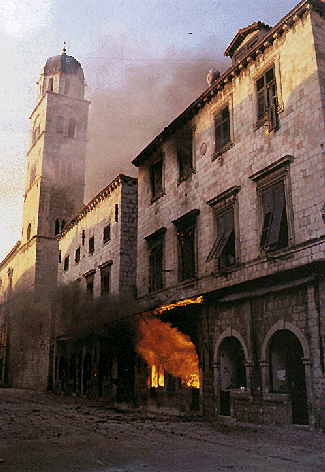
Stradun street in Dubrovnik, one of the most beautiful strets in the world,
after Serbian bombing.
GLAS IZ DUBROVNIKA / THE VOICE OF DUBROVNIK
18. studeni [November] 1991.
This is my first war (I was born just after the Second World War [1946]). It is not at all what I expected - and not only because of the truly astonishing extent of the atttack against purely civilian targets. I suppose that I had half - expected a war to involve continuous, even frantic, activity. Well, there is of course some of that; and in fact activity makes everything easier to bear, even if the achievement brings no more result thatn spitting into the wind. Hardest to indure is doing nothing, nothing but listen: listening to the mortars falling, listening to the stories of those to have lost relatives, neighbours, their homes, cars, boats. Listening, waiting; that, my friends, demands all of your courage. A less dramatic kind of courage than that of the defenders of this city, but a real endurance nontheless.
Quite another sort of courage will be needed afterwards. Several thousands must return; people must resettle, rebuild, repair. And not just repair structures and possessions, but also relationships. Whatever the atrocities perpetrated upon Croatia in general and Dubrovnik in particular, it is impossible to pick up the country and move it elsewhere. Serbia and Montenegro will remain neighbours. It will take every last drop of the internationalism for which Dubrovnik has for so long been famous, to repair relationship there. But, somehow, it will have to be done.
Relationships with the rest of Europe, and with North America, will also need reshaping and rethinking. When contrasted with the hospitality with which you have welcomed so many thousands of thousands of them, the inability or unwillingness of the EC [European Community] and the USA to take any constructive action is truly shameful. Shameful, too, was the pretence - only quite recently abandoned - that in this aggression against Croatia both sides were equally to blame: self - defence equated with attack. But, again, Dubrovnik needs its tourists; and so bitterness against the world outside, however understandable, would be counter - productive.
As you can see, I have allowed these two days of relative quiet to encourage me to play in my imagination with the period "after the war". Anything is better than the rockets and bombs. But the demands on your courage and patience will continue long after this is over.
K. V. Wilkes, IUC. 15 November 1991.
 Dr. Kathy Wilkes, professor of philosophy at Oxford University and Inter-University Centre in Dubrovnik. Photo by the courtesy of Nada Bruer Ljubišić of the IUC, Dubrovnik.
GLAS IZ DUBROVNIKA / THE VOICE OF DUBROVNIK
23. studeni [November] 1991
My friends: the British media, and letters to the British papers, are increasingly more and more sympathetic to Croatia, and outraged by the attacks on Croatia in general and Dubrovnik in particular. But there are occasional exceptions; and yesterday a friend in London faxed me a copy of a letter, published in The Times, from Miss Nora Beloff. She has long been known in Britain as a "Yugoslav expert"; but, I fear, has spent far more time in Serbia than in Croatia. Her letter infuriated me; and so I thought that for this day's piece I would give you a copy of the letter I sent to The Times in reply. (I have adjusted it here and there, to make it clearer to those who can't have seen Beloff's letter.)
Sir,
I is not easy to get The Times in Dubrovnik and it was only yesterday that a friend faxed me a page of it containing a letter from Miss Nora Beloff. She says that 'extremests dedicated to ridding Croatia of Serbs' are now 'learning the hard way, unfortunately at the expense of all lovers of Dubrovnik'. I am not; with some honourable exceptions they have done nothing to express this 'love'. My concern is with those living here; the 6% of Serbs and the 90% of Croatians. The snipers and the bombs do not discriminate between them - one of the early deaths from Serbian cannon was the great Serbian poet Milan Milšić. (Now he was a real 'lover of Dubrovnik'.) The shortage of food and water does not discriminate between them either. And Dubrovnk has no minoriy enclaves, and no history of Serb-Croat violence. One example, of the dozens available, would show better the virulence of the attack on everyone living here - regardless of race or raligion - than any list of blasted hospitals, ambulances, monasteries. 13000 refugees were bombed in to the city from the surrounding region. Almost 9000 of them have been sheltering in the formerly-tourist hotels. Who knows or cares whether they are Serb or Croat? Not the bombs. They have been shelled again, again, and again. They live, or try to live, behind the flying glass of large picture-windows; and have nowhere else to flee. Miss Beloff is right to say that flags and emblems identify this city as Croatian. It is, after all, Croatian. And it is as well a fully international city. The point is, Miss Belfof, that Croatia is indeed a dangerous animal: when attacked, it defends itself.
Yours sincerely,
dr. K. V. Wilkes
K. V. Wilkes, IUC
GLAS IZ DUBROVNIKA / THE VOICE OF DUBROVNIK
24. studeni [November] 1991.
In my last piece for Glasnik iz Dubrovnik [The Voice from Dubrovnik], I was writing about the eventual need for reconciliation. Today I wasn't to do something almost diametrically opposed to that: to give, in descending order, to list of the contemptible.
Head of my list must come the snipers. It is impossible to imagine anything more cowardly, more alien to all that makes the human spirit human. Snipers are not 'animals'; that would be grossly unfair to animals. Shooting at random at civilians in the streets.... this sickens the soul.
Nex come the looters. These are the leeches of the community; exploiting loss and misery. From those who already have their homes and possessions devastated they steal what little is left. Again, less than human.
Next: those who give the orders to bomb churches, hospitals, monasteries, ambulances, the fire station, the hydroelectric plant, so much civilian housing - all that is essential for civilian life. It is a long time, in the history of European warfare, that the civilian infrastructure has been this singled-out for attack.
Fourth, of course, those who carry out those orders. What goes through their minds, when they obey an order (heard, and taped, by radio amateurs) to "shoot the churches"? Admittedly, it takes a special kind of the courage to refuse an order from a commanding officer, and back in July General Adžić said in a speech that those who refuse to fight "must be shot without mercy and without regret". But the defence that he was "obeying orders" did not help Lieutenant Calley in the Vietnam War; one of my uncles was court-martialled and imprisoned during the Second World War, for refusing to fire on a village which he thought was defenceless.
Fifth: those Serb and Montenegrin civilians who lie low and say nathing; who are not rasing their voices in horrified protest against what their leaders and army are doing to Croatia. Increasingly, braver Serbs and Montenegrans are speaking out, but not yet enough; it does not, after all, take much courage.
And finally, politicians in the world beyond; who for far too long have merey said "tut, tut"; who have talked of sanctions "against Yugoslavia"; who throw words at Croatia when food, water, itervention are what are needed. Have I left out anyone?
K.V.Wilkes, IUC
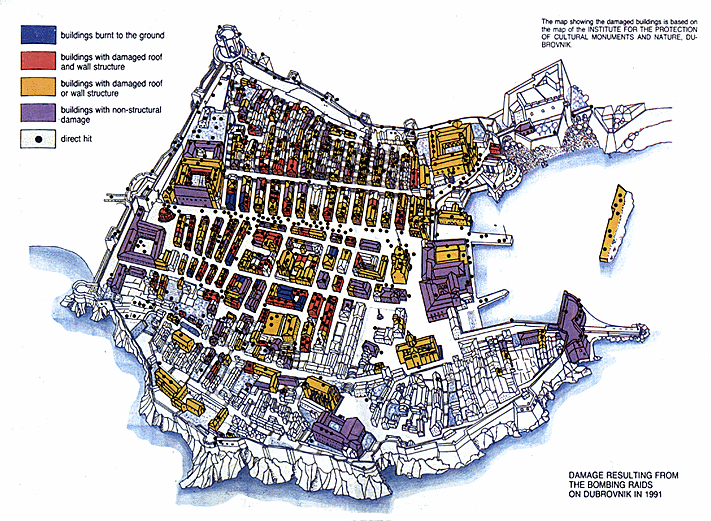
The map of Serbian bombing raids on Dubrovnik in 1991
GLAS IZ DUBROVNIKA / THE VOICE OF DUBROVNIK
25. studeni [November] 1991.
Dubrovnik: city of contrasts and paradoxes. A city of light and of sun, movement and colour; now black or dark gray at night, motionless after 9.00 p.m. A city of famous fountains, starved of water. A city that has for centuries been a centre of culture and international civilization, now rarely able even to telephone. A theatre for the world, now a theatre of war. A city trying to shelter thousands of refugees, but seeeing almost the same number leaving to shelter elsewhere. A route between Dubrovnik and Rijeka... via Zelenika. A city "protected" by the Hague Convention Spomenik Kulture flags [flags of the Munuments of Culture], one of which has a bomb-blast through the exact centre. An international and unviersial city, assalted viciously by its immediate neighbours. With no history of ethnic violence, but now right in the middle of an ethnic assault. A commune with no military installations treated as though it were an army camp. Relief ships that bring food for the children, the sick, and the elderly... and taking away to elsewhere same people. The navy, "greeting" the city with bombs and blokades, when it used to salute it with sirens. A maritime city, prevented even from sending fishing-boats out. Self-defence treated by a large part of the international community as though it were on a par with aggression. A city of gold adn lead.
K.V. Wilkes
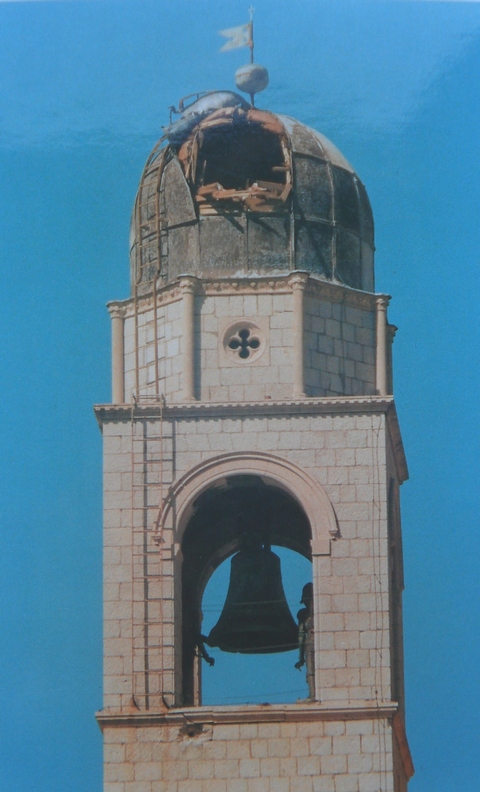 City bell-tower in Dubrovnik, on the main street of Stradun, a monumnet of culture, shot in 1991 during the Serbian agression on Croatia.
GLAS IZ DUBROVNIKA / THE VOICE OF DUBROVNIK
30. studeni [November] 1991.
On 29th (day 59) [day 59 of the Serbain and Montenegrin siege of the City] we saw three bright UNESCO flags flying above the Old City: blue, like Dubrovnik's sea and sky, and white, like its stones. Many will be asking whether they will give greater protection than the "Spomenik kulture" flag [Monument of culture flag] of the Hague Convention. These often seemed to provide targets for the army rather than defence from it; I mentioned, in an earlier piece, the "Spomenik kulture" flag in Rijeka dubrovačka with a rocket hole in its exact centre.
Well: UNESCO is UNESCO. It should take an even greater degree of barbarity, contempt for world opinion, and recklessness about the likelihood of international intervention, to fire on places thus protected than on buildings and monuments protected by the flag of the Hague Convention. Yugoslavia (as it then was) signed the UNESCO "Convention Concerning the Protection of the World Cultural and Natural Heritage". The convention has a "World Heritage Committee", which draws up a list of sites and monuments (selected from those proposed for inclusion by member countries), choosing those which it considers part of the world's natural and cultural heritage. Sites and monuments thus included are - I quote from the introduction to UNESCO's 1982 [misprinted 1992] desk diary - "considered to be of such exceptional interest and universal value that their protection is the reponsibility of all mankind"; and "on signing the Convention each country pledges to conserve the sites and monuments" (are you listening, Belgrade? You proposed Dubrovnik for inclusion). "In return the international community helps them protect these marvels".
Simply being on UNESCO's list, though, has not helped Dubrovnik so far; nor Split, nor Plitivce [lakes] (also listed). But perhaps the flags, and the presence of two UNESCO representatives, who will report daily to the Paris headquarters and who, before they leave, will set up a permanent office here, might bring home to the aggressors the mindless barbarity of what they have already done. It was splended to hear, at the press conference, that the concern of the UNESCO pair is not only with Dubrovnik's heritage itself, but also with those who preserve, inhabit, and continue this living heritage. Thus the whole city, not just the Old City, has become UNESCO's concern.
Many have asked why UNESCO (and other international organizations) were not here far, far sooner. We heard much of the reason at the press conference: this is the VERY FIRST TIME tha UNESCO has ever sent a mission to a region in a state of war. Such a major switch of policy cannot be made overnight; bureaucracy, and especialy international bureaucracy, always works slowly.
Internation action more generally is lumbering around, steadily, to understanding the reality of the situation. (A I was typing this, of Friday morning, the text of a UN Security Council Resoluton came over the fax; the contents of the Resolution are promising.) And it is starting to understand not only the threat to Dubrovnik; even though the fame of Dubrovnik may have made more vivid, to the outside world, the agony of the Croatia to which it belongs.
K.V. Wilkes
Konvoj Libertas
GLAS IZ DUBROVNIKA / THE VOICE OF DUBROVNIK
4. prosinac [December] 1991.
There is a proposal - and I do not know at the moment what will become of it - to send some of Dubrovnik's museum pieces (roughly, objects of art that are portable) on an exhbition-tour of some European countries; most likely, Italy, Britain, France. Along with such tersures would go an exhibition of Dubrovnik's war; pieces of rocket and mortar, bits of shattered stone, videos of the bombing, and the photographic record of the destruction. The exhibition would be called "Dubrovnik: city of Gold and of Lead".
Many popele, I gather, are understandably upset, or at least feel ambivalent, about this idea. They know how much Dubrovnik has ALREADY lost; must it also lose, even temporarily, some of the art treasures that belong to its heritage? It is bad engough to lose so many people (and, to speak only for myself, I was grieved to hear those organizing the "humanitarian corridor" publicly ENCOURAGING more women, children, and the elderly to leave); is Dubrovnik also to be stripped of much of its artistic, as well as its human, richness?
However, I suggest that this is a time to think positively and practically. Practically: these objects would be safe, protected. We have all heard how the army sweeps through towns and villages like locusts, devouring and looting anything they can carry or put in their lorries. Heaven alone knows how much of its heritage Croatia has already had stolen-away from it, burned, or bombed to destruction. The day before I wrote this (I do not know when, or if, this will be published) was the day the army was trying to destroy the cross at the top of [the hill of] Srđ; that shows better than anything the army attitude towards objects that have religious aesthetic, cultural, or historical importance.
Positively: such an exhibition would give those who saw it a double shock. First, the shock of seeing the grandeur and the beauty of the artefacts that have come from the City of Dubrovnik. Second, the shock of seeing the evidence of the brutality of that attack.
Nobody, I imagine, would object to a travelling exhibition which both celebrated the glories of Dubrvonik and drew attention of its destruction - IF we were at peace. After all, I suppose that everyone was proud to see that magnificent exhibition, "The Golden Age of Dubrovnik" travel outside the city. It is the loss of yet another strand in the web of Dubrovnik's identity just NOW: it is that which hurts.
Well: it may never heppen. But believe me, my friends, I sympthise most fully with your unhappiness about the idea.
K.V. Wilkes, IUC, 3. XII. 1991.
GLAS IZ DUBROVNIKA / THE VOICE OF DUBROVNIK
5. prosinac [December] 1991.
Let us have, for a change, a piece that has NOTHING to do with our crisis situation.
I am trying to learn Croatian, Your langague is not easy, my firneds; I have been trying, on and off, for quite a while now. Moreover, my memory would make a sieve, by comparison, seem like a watertight container. How much easier it was to learn languages when young! The Latin, Greek and (little) French which I learned at school are with me still - the Greek the best, since I have to use in my work.
One problem for my attempts to learn Croaian is the Inter-University Centre itself, where (until recently) I spend practically all my time when in Dubrovnik. Almost everyone in the Secretariat seems to have fluent English, not to mention French, German or Italian. So, when working at the IUC, there is rarely any need to try to speak Croatian; all that is needed is the very basic linguistic equipment required fro shopping, travelling, etc. Another problem is that I am lazy.
But ah, the shame of it! I say, truthfully, that I have been coming here for twelve years now. So there is really no excuse. And, because of twelve years I have made many good friends, I get invited to their homes... and there meet their parents or children, or their friends, who perhaps do not speak English; and all I have is baby-talk. There is also the absurdity of asking "gdje?" [where?], or "zašto?" [why?], and not understanding the answer.
It is a pitty, though, that the recent increments to my vocabulary have been such words as "rat" [war] , "žbuka" [mortar], "raketa" [rocket], "snajper" [sniper], "rana" [wound], "bombardirti" [to bomb], "sklonište" [shelter], "blokada" [blockade], "napad" [attack]. (You see now, even in this piece, the war creeps back into the subject?) Next time you see me, speak to me SLOWLY, in simple Croatian; and be prepared to switch to English. I'll get there somehow, eventually.
K.V. Wilkes, IUC
GLAS IZ DUBROVNIKA / THE VOICE FROM DUBROVNIK
7. prosinac [December] 1991.
Listen to us ...
We appeal to all good people of the world, all good people of Croatia, Italy, France, the whole Europe, to all the sea captains, This is your moment. Dubrovnik needs help. Turn your ships and start towards Dubrovnik, Don't let the criminals to stop you, Ignore them.
All the people who trust in Red Cross start for Dubrovnik because they [Serbain army] demolished International Red Cross headquarters; to you who trust in the idea of water becasue the oldest well in Europe is destroyed; to you who trust in health becuse the pharmacy is pulled down. To all who have any faith or religion, who are Orthodox, Catholic, Moslems, Jews start towards Dubrovnik. Oppose to the monster which has never been seen yet. Ignore that proper tiger, that monster of evil which does not deserve to exist.
All of you who are the soldiers of the monster say that you are never again ready to work for the curse, that you will never listen to the unhuman. Dubrovnik sends you Gundulić's message of freedom, offers you the last chance. Run away from the criminals, from those who, even today after they did this to Dubrovnik, they tell they did not know. Reject the Nazi successors, reject those who set Dubrovnik aflame like the ovens of Auschwity, who burn the citizens of Dubrovnik like those in concentration camps in Germany. Reject Hitler's successors. Tell them - enought, and tell them - NE!
Dr. Slobodan Lang
|
Listen to us ...
Serbia will never recover from this.
Croatia - Dubrovnik - will take a very long time to recover, but recover they will. Serbia, however, has an indelible stain on its flag, its honour. This culmination of its attack on Croatia will go down in history as a crime with few parallels; Serbia has been accused, tried, and found guilty by every democratic country in the world. The sentence should be heavy: war reparations on a massive scale, trials for war crimes.
Nor should the wider world quickly forget its shame. It is reacting now; but too late; too late to do more than help to pick up the pieces. What it MUST do, now that International outrage will compel action, is to come with force, come with relief, come with funds. Later it must enforce war reparations upon Serbia, and bring before an international court those accused of war crimes.
What Serbians must do - the only thing they CAN do, to retrieve a fraction of their integrity - or to rise up in fury to overthrow the government that perpetrated such criminal acts in their name.
Did it take attacks upon the buildings and monuments of the Old City, rather than the devastation in Mokošica, Župa Dubrovačka, Gruž, Lapad - not to mention Dubrovnik, Osijek, and so very many more - to awaken world reaction? Yes my friends, I fear it did.
I must now sign this from the Skupština Općine; what remains of the Inter-University Centre is now a shell, still burning as I write this on the morning 7th November [1991, see below]. But, like a phoenix, the IUC will rise again. Along with the City of Dubrovnik.
K.V. Wilkes, Skupština općine [Municipality council] |
BLACK FRIDAY [6 December 1991]
The balance of the black friday: 19 dead and 60 wounded, mostly civilians - according to uncompleted facts. How many houses are pulled down o rburnt, how many destroyed or damaged cultural monumnets - these are all the facts to be seen yet. At the moment, we can only say for sure the picture of destroyed city is frightening.
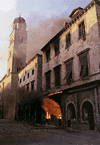
Barbarian rhapsody
(from the presentation by prof.dr. Enver Sehovic, University of Zagreb)
  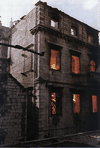   1991 Greter Serbian bombing and shelling of Dubrovnik 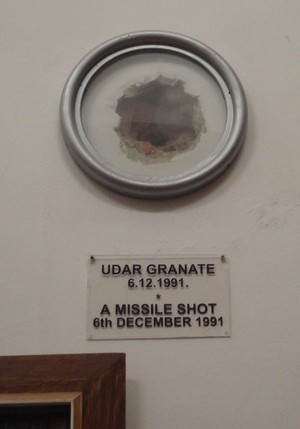
A missile shot in December 6 1991 to the convent of Minor Brothers in Dubrovnik. This convent only was hit with 50 (fifty) direct granade hits during the Serbain agression, causing a lots of damage on this top monument of Croatian culture. The hall hit by the granade is precisely the place where the oldest European pharmacy working continuously to these days was founded in 1317.
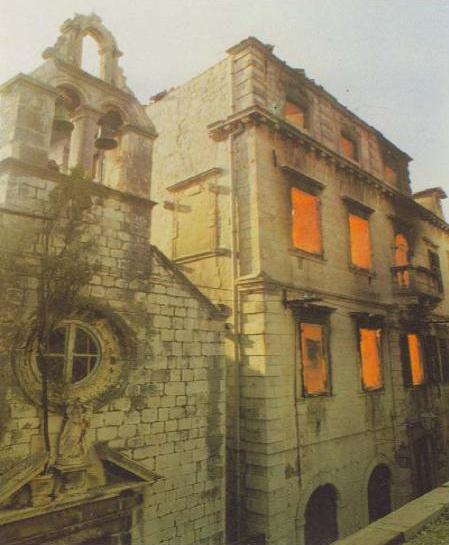
Old buildings on Stradun (central street) in flame, after savage Serbian bombing and shelling. Date 6 Dec 1991.
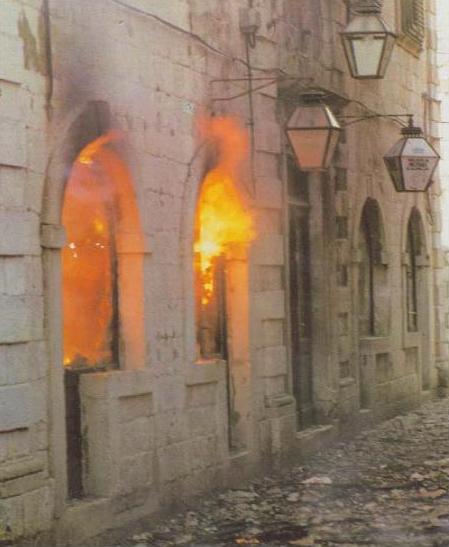 Stradun, the central street in Dubrovnik. The City is on the UNESCO list of World Heritage. The above two photos by Milo Kovač. 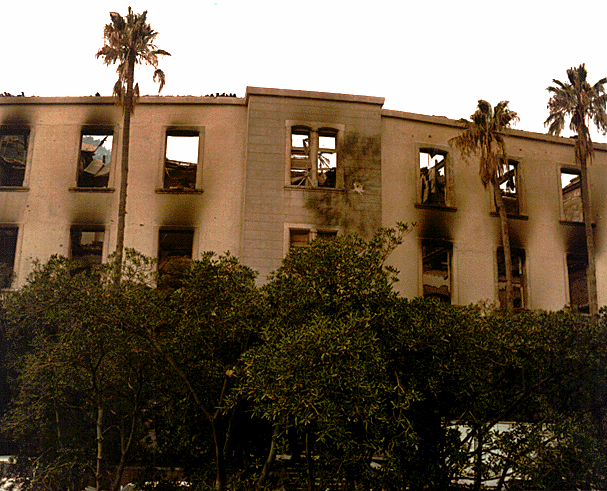
Inter-University Center in Dubrovnik after Serbian bombing in 6 December 1991.
Its very valuable library was set afflame and dissappeared in ashes.
Dr. Wilkes donated several thousads of books from her own library in Oxford, to start the new library.
GLAS IZ DUBROVNIKA / THE VOICE FROM DUBROVNIK
10. prosinac [December] 1991.
The little things, the things that don't hit the headlines. People as they stand talking, frequently putting thumbs in wastbands to hitch up trousers and skirts that have become too big. The delight with which we sometimes hear water gurgling, brifely, into the system. The astonishement of friends in Zagreb to hear that one CAN wash, all over, in half a litre of cold water, in December. The music [of Serbian aggression] from Žarkovitsa. The names of the two American senators who have been most helpful: Gore and Dole. People who have finished their last candle going to bed at 4.30 p.m. Hearing that the Serbian media had reported that CROATIAN forces had bombed Dubrovnik (with rockets from the sea, and wire guided missiles?) A map of Europe on the wall of a flat that was bombed... the map intact except for a hole where the city of Dubrovnik used to be. The control at Zelenica stealing gas cylinders sent to Dubrovnik from Rijeka and Split, and then to people in Cavtat and Mokošica. People wearing thick coats indoors. The surprise of a freign journalist when nobody in the Skupština Općine jumped around in excitement, or even interrupted their conversations, when shooting and bombing started again on devastated [hill of] Srđ. Driving along Stradun; driving with no lights at night; driving the wrong way up one way streets. The smell of burning cofee warehouse in Gruž [Dubrovnik port]. The bruises from tripping over, or bumping into, things in the dark. The population distribution in the city giving a new meaning to the phrase of male domination. The Old City at night - black, motionless. The small children with grey hair after two and a half months in shelters in Vukovar but no, no; that is a BIG thing. So is the recrucified Christ on the crucifix from Mokošica.
Personally? Wondering whether I shall ever want to eat spaghetti again, after the war. Discovering how much better that spaghetti tastes than the inapppropriately rich meals on occasional visits to hotel Argentina. Finding myself saying something favourable about Mrs. Thatcher. Learning to drink tea and coffee even if sugared. Learning the real meaning of friendship.
K.V. Wilkes, IUC 4. XII 1991. g.
|